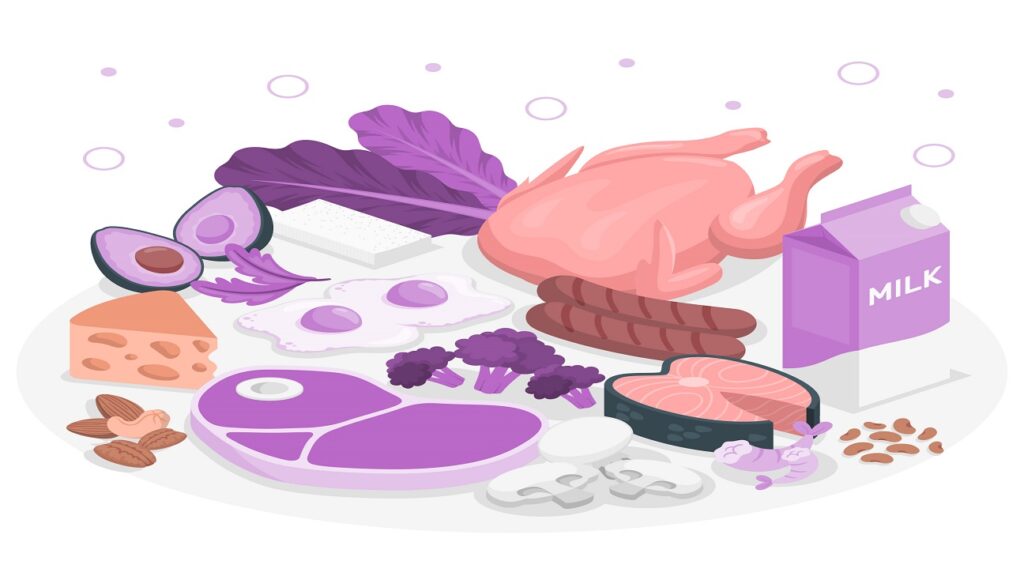
Inflammation is a natural process that helps the body fight off infection and heal injuries. However, chronic inflammation can contribute to a variety of health problems, including heart disease, diabetes, and cancer (1
PubMed Central
Highly respected database from the National Institutes of Health
Go to source ). One way to reduce chronic inflammation is by eating a diet rich in anti-inflammatory foods.
What Are the Top Anti-Inflammatory Foods?
Fruits and Vegetables
Fruits and vegetables are packed with vitamins, minerals, fiber, and phytochemicals that help reduce inflammation. Some of the best choices include:
- Berries: Blueberries, raspberries, strawberries, and blackberries are all rich in antioxidants and anti-inflammatory compounds.
- Cherries: Tart cherries, in particular, are high in anthocyanins, which have anti-inflammatory effects.
- Oranges: Citrus fruits like oranges are high in vitamin C, which is an antioxidant that helps reduce inflammation.
- Kiwi: Kiwis are rich in vitamin C, vitamin K, and potassium, all of which have anti-inflammatory effects.
- Leafy Greens: Kale, spinach, collard greens, and other leafy greens are rich in antioxidants and anti-inflammatory compounds.
- Broccoli: Broccoli is high in sulforaphane, a compound that has anti-inflammatory effects.
- Sweet Potatoes: Sweet potatoes are high in beta-carotene, which has anti-inflammatory effects.
Nuts and Seeds
Nuts and seeds are high in healthy fats, protein, and fiber, as well as antioxidants and anti-inflammatory compounds. Some of the best choices include:
- Almonds: Almonds are high in vitamin E, which is an antioxidant that helps reduce inflammation.
- Walnuts: Walnuts are high in omega-3 fatty acids, which have anti-inflammatory effects.
- Chia Seeds: Chia seeds are high in fiber and omega-3 fatty acids.
- Flaxseeds: Flaxseeds are high in fiber, lignans, and omega-3 fatty acids, all of which have anti-inflammatory effects.
Whole Grains
Whole grains are an excellent source of fiber, vitamins, and minerals, as well as anti-inflammatory compounds. Some of the best choices include:
- Oatmeal: Oatmeal is high in beta-glucan, a type of fiber that has anti-inflammatory effects.
- Brown Rice: Brown rice is high in fiber and antioxidants.
- Quinoa: Quinoa is high in protein, fiber, and antioxidants.
- Whole-Wheat Bread: Whole-wheat bread is high in fiber, vitamins, and minerals.
Fatty Fish
Fatty fish like salmon, mackerel, tuna, and sardines are high in omega-3 fatty acids, which have powerful anti-inflammatory effects.
Spices and Herbs
Spices and herbs are packed with anti-inflammatory compounds and can add flavor to your meals. Some of the best choices include:
- Turmeric: Turmeric is high in curcumin, a compound that has anti-inflammatory effects.
- Ginger: Ginger contains gingerols, which have anti-inflammatory effects.
- Garlic: Garlic contains allicin, which has anti-inflammatory effects.
- Basil: Basil contains eugenol, which has anti-inflammatory effects.
- Rosemary: Rosemary contains rosmarinic acid, which has anti-inflammatory effects.
Tea
Tea, particularly green tea, is high in antioxidants and anti-inflammatory compounds. Other good choices include black tea, white tea, and chamomile tea.
Dark Chocolate
Chocolate with a high cocoa content (at least 70%) contains flavonoids, which have anti-inflammatory properties.
Olive Oil
Olive oil is high in monounsaturated fats and contains anti-inflammatory compounds. Use it as a dressing or for cooking instead of other oils.
Legumes
Legumes like lentils, chickpeas, black beans, and kidney beans are an excellent source of protein, fiber, and anti-inflammatory compounds.
Inflammatory Foods
On the other hand, some foods can promote inflammation and should be limited in your diet. These include:
- Processed Foods: Processed foods are often high in sugar, refined carbohydrates, and unhealthy fats, all of which can contribute to inflammation.
- Saturated Fats: Saturated fats, which are found in red meat, butter, and cheese, can increase inflammation.
- Trans Fats: Trans fats, which are found in fried foods, baked goods, and some processed foods, can also increase inflammation.
- Refined Carbohydrates: Refined carbohydrates, like white bread and pasta, can cause a rapid spike in blood sugar, which can contribute to inflammation.
The Bottom Line
By incorporating more anti-inflammatory foods and limiting your intake of inflammatory foods, you can help reduce chronic inflammation and improve your overall health. Remember to choose a variety of foods from each category and aim for a balanced and colorful diet. Additionally, it’s important to speak with a healthcare professional before making significant changes to your diet, especially if you have any medical conditions or concerns.




